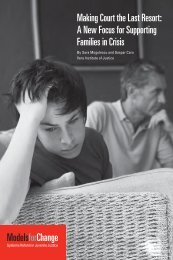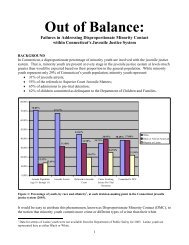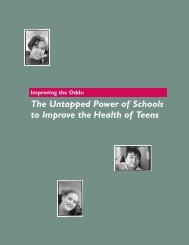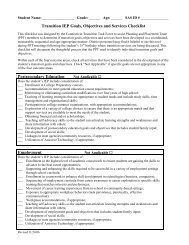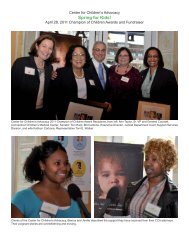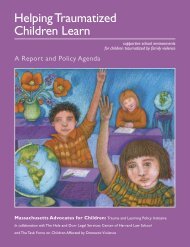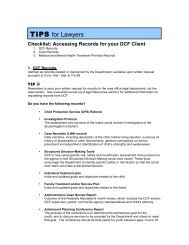Utility Access and Health - Center for Children's Advocacy
Utility Access and Health - Center for Children's Advocacy
Utility Access and Health - Center for Children's Advocacy
Create successful ePaper yourself
Turn your PDF publications into a flip-book with our unique Google optimized e-Paper software.
Problems Run Deeper: Need <strong>for</strong> Regulatory ChangeDespite the success of trainings, Energy Clinic <strong>and</strong> the<strong>Utility</strong> First Aid Kit, MLP | Boston staff soon noticed anew problem. Through regular interaction with healthcare providers, MLP | Boston attorneys learned thatpatients <strong>and</strong> physicians were still being burdened byheavy paperwork related to the recertification process.Laws in Massachusetts required that families recertifytheir medical eligibility <strong>for</strong> shut-off protection every30 to 90 days (depending on the illness). This meantthat many families had to come back to their cliniciansagain <strong>and</strong> again to request new letters while dealingwith illnesses. One chronically ill patient needed tenseparate shut-off protection letters from his physician.These requirements created an added stress <strong>for</strong>patients, who were faced with the constant threat oflosing their utility protection <strong>and</strong> had to make moretrips to the hospital to get letters. This often leadsto time away from work <strong>and</strong> additional transportationexpenses. At the same time, busy health carestaff were burdened by administrative work relatedto the frequent requests <strong>for</strong> recertification letters,contributing to the sense of overwhelm that pervadeshealthcare providers serving low-income populations.Nurses had to make sure eachletter contained a parent’s signature,a doctor’s signature, <strong>and</strong> the family’sutility account number. When someutility companies began to claim theyweren’t receiving the faxed letters, the nurseshad to keep a copy of each individual fax sentout as proof.“It’s frustrating to have such a complicated systemregulate such a basic need as energy,” MLP | Bostonpro bono director JoHanna Flacks says. “But instead offocusing that frustration on patients, it’s important touse it to make the system better serve the people it’sdesigned to protect.”With an eye towards systemic change, MLP | Bostonlawyers set out to help their patient-clients by improvingthe recertification process <strong>for</strong> utilities shut-off protection.To get a sense of the political l<strong>and</strong>scape surroundingenergy policy, the legal team reached out to Charlie Harak,a lawyer at the National Consumer Law <strong>Center</strong> (NCLC),well-recognized as a leading expert in utility consumerprotection law. 11 Harak shared Flacks’ commitment tomaking progress at the public policy level.“When you create systemic solutions in any state,you can protect literally thous<strong>and</strong>s, if not tens of thous<strong>and</strong>s,of people from losing their utility service,” Haraksays. “If you’re changing the rules, you make sure allcustomers will get the benefit of what otherwise onlyan individual with a good advocate would get.”Flacks also reached out to Kathy Tobin, the directorof energy services <strong>for</strong> Action <strong>for</strong> Boston CommunityDevelopment, Inc. (ABCD). 12 Like Harak,Tobin was excited about the possibilityof having doctors support ABCD’sadvocacy. And because of her previousadvocacy experience, Tobin was ableto share her knowledge of the utilitiescommission with Flacks as the two preparedto advocate <strong>for</strong> their low-income clients.DPU HearingsThe Department of PublicUtilities opens hearingsregarding regulation changes.MLP is in a unique position toprovide expert testimony.Policy ChangesNew rules extend the protectionperiod <strong>for</strong> chronically illpatients, authorizes nursepractitioners <strong>and</strong> physicianassistants to write letters <strong>and</strong>provides broader access <strong>for</strong>infants <strong>and</strong> the elderly.ImpactPatients <strong>and</strong> providers areless burdened by the recertificationprocess. Low-incomefamilies have greater accessto shut-off protection thatprotects health.



